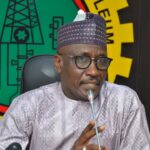- Close DSDP contracts.
CEM REPORT, ENERGY | The Nigerian National Petroleum Company Limited (NNPCL), has said that private companies would start importing petrol products within the month.
The company said the move will act as a natural means to bring down the price of petrol in the country.
Group Chief Executive Officer NNPCL, Mele Kyari, stated this during an interview on Arise TV.

MELE KYARI – GMD, NNPCL
He explained that private businesses’ involvement in the importation of petrol will usher in competition in the sector which will eventually lead to price determination by market forces.”
All we did was to set variable prices depending on our costs by location and knowing fully well that NNPC is the single supplier of the market and we are seeing that exit coming very, very quickly.
“There will be no monopoly, NNPC will not continue being the supplier of this product alone.”
The NNPCL statement is in a clear response to the call by the Independent Petroleum Marketers Association of Nigeria (IPMAN) asking President Bola Tinubu to fulfil his mandate on the total deregulation of the downstream of the petroleum sector.
After taking a firm stance in favour of eliminating fuel subsidies, IPMAN stated in a statement signed by its president and national secretary, Debo Ahmed and Chief John Kekeocha, respectively, that Tinubu must now move to ensure that the national oil company’s exclusive right to import petrol was violated.
IPMAN pleaded with Tinubu to make sure that participants in the downstream sector other than NNPCL were permitted to participate in the importation of gasoline into Nigeria.
“The primary essence of removing subsidy is to free the market and make it competitive,” it explained that allowing other interested parties into the petroleum supply network, either through local refining or importation, will guarantee adequate production and supply and ultimately crash prices.
“This will precipitate reasonable reductions in the high price that is being witnessed at this initial take off.”
In another report, the NNPCL boss stated that the company has terminated its crude-for-petrol swap deal, otherwise called Direct Sale Direct Purchase (DSDP) contracts, with foreign refiners and consortia of traders.
He noted that NNPCL would now pay cash for petrol imports, according to Reuters..
The move is reportedly part of Tinubu’s plans to deregulate the petrol market and reduce the burden of subsidy payment on government finances.
“In the last four months, we practically terminated all DSDP contracts. And we now have an arm’s-length process where we can pay cash for the imports.
“This is the first time NNPC has said it is terminating crude swap contracts. By importing less petrol, as private companies import the bulk, NNPC will be able to pay for its purchases in cash.”
Since 2016, NNPCL has been importing gasoline from groups of international and domestic trading companies and paying them back through DSDP contracts with crude oil since it lacked the funds to do so on a cash-and-carry basis.
According to Reuters, the NNPCL owes the consortiums nearly $2 billion according to a September 2022 NNPC report to the Federation Account Allocation Committee.
[READ ALSO] Fuel Subsidy Removal Shoots Transportation Cost by 50% Around Lago
The debt grew as a result of a sharp decline in oil output last year and high global fuel costs brought on by the conflict in Ukraine.
According to a direct industry source, cited by Reuters, NNPC was still allocating crude for fuel swaps for July loading, but at a lower rate than in prior months.
In its report detailing March crude oil loadings, NNPCL allocated crude to the swap contracts held by the consortiums, the report said.
Additionally, Kyari stated that Nigeria’s total crude and condensate output was at 1.56 million barrels a day (bpd) as of Friday.
Following the President’s declaration that all petrol subsidies would be eliminated during his inauguration address, the NNPCL increased the price of petrol at the pump by approximately 200% nationally, from N195 per litre to between N488 and N557.
The big question is whether the NNPCL will fulfil its obligation to provide 300,000 bpd of petroleum to the recently built 650,000 bpd Dangote Refinery.
It should be noted that Nigeria has had difficulty fulfilling its OPEC oil quota of 1.742 million bpd because of widespread oil theft and unlawful processing.












